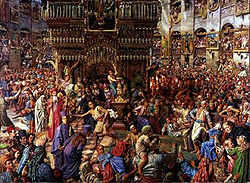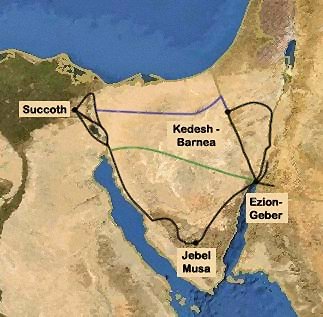‘Holy Fire’ or Orthodox Hoax?
Friday, April 22nd, 2011
The Miracle of Holy Fire painting
Tomorrow, many of the Eastern Orthodox will believe a miracle involving fire will occur. As they did last year:
Thousands of Orthodox Christians celebrate holy fire ritualAssociated Press – April 3, 2010 By Yaniv ZoharJERUSALEM …Orthodox Christians believe Jesus was crucified and buried at the site where the Church of the Holy Sepulcher now stands and that a flame appears spontaneously from his tomb on the day before Easter to show he has not forgotten his followers…
The holy fire ritual dates back at least 1,200 years. The precise details of the flame’s source are a closely guarded secret. http://www.deseretnews.com/article/700021817/Thousands-of-Orthodox-Christians-celebrate-holy-fire-ritual.html
Holy Fire arrives in Moscow, taken to main cathedral
RIA Novosti – April 3, 2010
The Holy Fire from Jerusalem arrived at Moscow’s Vnukovo Airport on Saturday evening and was taken to Christ the Savior Cathedral, the Foundation of St. Andrew the First-Called said on Saturday.
A special flight with a delegation of Russian religious, government and public figures landed at 22:30 Moscow time….
The Holy Fire that is lit every year at the Church of the Holy Sepulcher in Jerusalem on the day preceding Orthodox Easter is believed by Orthodox Christians to be a miracle. http://en.rian.ru/russia/20100403/158424998.html
Holy Fire
The Holy Fire (Greek Ἃγιον Φῶς, “Holy Light“) is described by Christians as a miracle that occurs every year at the Church of the Holy Sepulchre in Jerusalem on Holy Saturday, the day preceding Orthodox Easter. It is considered by many to be the longest-attested annual miracle in the Christian world. (Holy Fire. Wikipedia, April 4, 2010).
Some however question it and understand that this is not a miracle:
Holy Fire brings Jerusalem Easter to joyful climax
By Alastair MacdonaldReuters
Saturday, April 3, 2010; 2:47 PMJERUSALEM (Reuters)…Roman Catholics and Protestants, however, eschew the Holy Fire rite; Western visitors have for centuries scoffed at the ceremony in which the Greek Orthodox patriarch of Jerusalem produces a lighted candle from the sealed and empty tomb — without the aid of matches or other, visible, terrestrial aids.http://www.washingtonpost.com/wp-dyn/content/article/2010/04/03/AR2010040301634.htmlMystery of Jerusalem’s Holy Fire comes to lightTelegraph, London – April 16, 2001 By Alan Philps in Jerusalem
… one Armenian torch-bearer, Soukias Tchilingirian, felt the truth had to be told. He said: “It’s not a miracle. The Greek priests bring in a lamp – one that has been kept burning for 1,500 years – to produce the Holy Fire. For pilgrims full of faith who come from abroad, it is a fire from Heaven, a true miracle. But not for us. Of course the source of the fire is ancient and symbolic. I heard this from my father and I think he knew the truth.” http://www.telegraph.co.uk/news/worldnews/middleeast/israel/1311064/Mystery-of-Jerusalems-Holy-Fire-comes-to-light.html
Why is this important?
The Bible warns that someone will come with signs and lying wonders to mislead the world:
8 And then the lawless one will be revealed, whom the Lord will consume with the breath of His mouth and destroy with the brightness of His coming. 9 The coming of the lawless one is according to the working of Satan, with all power, signs, and lying wonders, 10 and with all unrighteous deception among those who perish, because they did not receive the love of the truth, that they might be saved. 11 And for this reason God will send them strong delusion, that they should believe the lie, 12 that they all may be condemned who did not believe the truth but had pleasure in unrighteousness. (2 Thessalonians 2:8-12)
Furthermore, “fire from heaven” will be one of those signs:
11 Then I saw another beast coming up out of the earth, and he had two horns like a lamb and spoke like a dragon. 12 And he exercises all the authority of the first beast in his presence, and causes the earth and those who dwell in it to worship the first beast, whose deadly wound was healed. 13 He performs great signs, so that he even makes fire come down from heaven on the earth in the sight of men. 14 And he deceives those who dwell on the earth by those signs which he was granted to do in the sight of the beast, telling those who dwell on the earth to make an image to the beast who was wounded by the sword and lived. (Revelation 13:11-15)
By currently believing in “holy fire” many Orthodox are unknowingly setting themselves up to accept the signs and lying wonders that the Bible warns about. All, including the non-Orthodox, need to understand that signs and wonders are NOT of themselves proof that something is of God, including the annual ritual of “holy fire”.
So, when reports come about about this tomorrow and Sunday, please realize that just because fire is shown, does not mean that God caused it.
Some articles of possibly related interest may include:
Two Horned Beast of Revelation and 666 Who is 666? This article explains how the LCG views this, and compares this to Ellen White.
Europa, the Beast, and Revelation Where did Europe get its name? What might Europe have to do with the Book of Revelation? What about “the Beast”? Is an emerging European power “the daughter of Babylon”? What is ahead for Europe?
Some Similarities and Differences Between the Orthodox Church and the Living Church of God Both groups claim to be the original church, but both groups have differing ways to claim it. Both groups have some amazing similarities and some major differences. Do you know what they are?
Some Doctrines of Antichrist Are there any doctrines taught outside the Churches of God which can be considered as doctrines of antichrist? This article suggests at least three. It also provides information on 666 and the identity of “the false prophet”. Plus it shows that several Catholic writers seem to warn about an ecumenical antipope that will support heresy.
Catholic Prophecies: Do They Mirror, Highlight, or Contradict Biblical Prophecies? People of all faiths may be surprised to see what various Roman and Orthodox Catholic prophets have been predicting as many of their predictions will be looked to in the 21st century.










